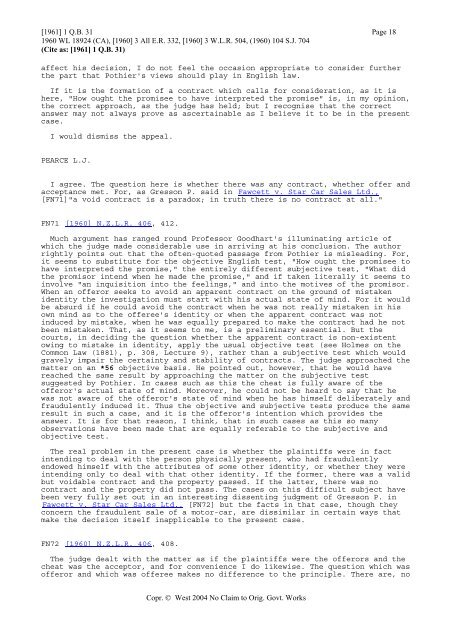Tesco v Constain - Thomson Reuters
Tesco v Constain - Thomson Reuters
Tesco v Constain - Thomson Reuters
Create successful ePaper yourself
Turn your PDF publications into a flip-book with our unique Google optimized e-Paper software.
[1961] 1 Q.B. 31 Page 181960 WL 18924 (CA), [1960] 3 All E.R. 332, [1960] 3 W.L.R. 504, (1960) 104 S.J. 704(Cite as: [1961] 1 Q.B. 31)affect his decision, I do not feel the occasion appropriate to consider furtherthe part that Pothier's views should play in English law.If it is the formation of a contract which calls for consideration, as it ishere, "How ought the promisee to have interpreted the promise" is, in my opinion,the correct approach, as the judge has held; but I recognise that the correctanswer may not always prove as ascertainable as I believe it to be in the presentcase.I would dismiss the appeal.PEARCE L.J.I agree. The question here is whether there was any contract, whether offer andacceptance met. For, as Gresson P. said in HFawcett v. Star Car Sales Ltd.,[FN71]"a void contract is a paradox; in truth there is no contract at all."FN71 H[1960] N.Z.L.R. 406, 412.Much argument has ranged round Professor Goodhart's illuminating article ofwhich the judge made considerable use in arriving at his conclusion. The authorrightly points out that the often-quoted passage from Pothier is misleading. For,it seems to substitute for the objective English test, "How ought the promisee tohave interpreted the promise," the entirely different subjective test, "What didthe promisor intend when he made the promise," and if taken literally it seems toinvolve "an inquisition into the feelings," and into the motives of the promisor.When an offeror seeks to avoid an apparent contract on the ground of mistakenidentity the investigation must start with his actual state of mind. For it wouldbe absurd if he could avoid the contract when he was not really mistaken in hisown mind as to the offeree's identity or when the apparent contract was notinduced by mistake, when he was equally prepared to make the contract had he notbeen mistaken. That, as it seems to me, is a preliminary essential. But thecourts, in deciding the question whether the apparent contract is non-existentowing to mistake in identity, apply the usual objective test (see Holmes on theCommon Law (1881), p. 308, Lecture 9), rather than a subjective test which wouldgravely impair the certainty and stability of contracts. The judge approached thematter on an *56 objective basis. He pointed out, however, that he would havereached the same result by approaching the matter on the subjective testsuggested by Pothier. In cases such as this the cheat is fully aware of theofferor's actual state of mind. Moreover, he could not be heard to say that hewas not aware of the offeror's state of mind when he has himself deliberately andfraudulently induced it. Thus the objective and subjective tests produce the sameresult in such a case, and it is the offeror's intention which provides theanswer. It is for that reason, I think, that in such cases as this so manyobservations have been made that are equally referable to the subjective andobjective test.The real problem in the present case is whether the plaintiffs were in factintending to deal with the person physically present, who had fraudulentlyendowed himself with the attributes of some other identity, or whether they wereintending only to deal with that other identity. If the former, there was a validbut voidable contract and the property passed. If the latter, there was nocontract and the property did not pass. The cases on this difficult subject havebeen very fully set out in an interesting dissenting judgment of Gresson P. inHFawcett v. Star Car Sales Ltd., [FN72] but the facts in that case, though theyconcern the fraudulent sale of a motor-car, are dissimilar in certain ways thatmake the decision itself inapplicable to the present case.FN72 H[1960] N.Z.L.R. 406, 408.The judge dealt with the matter as if the plaintiffs were the offerors and thecheat was the acceptor, and for convenience I do likewise. The question which wasofferor and which was offeree makes no difference to the principle. There are, noCopr. © West 2004 No Claim to Orig. Govt. Works
















